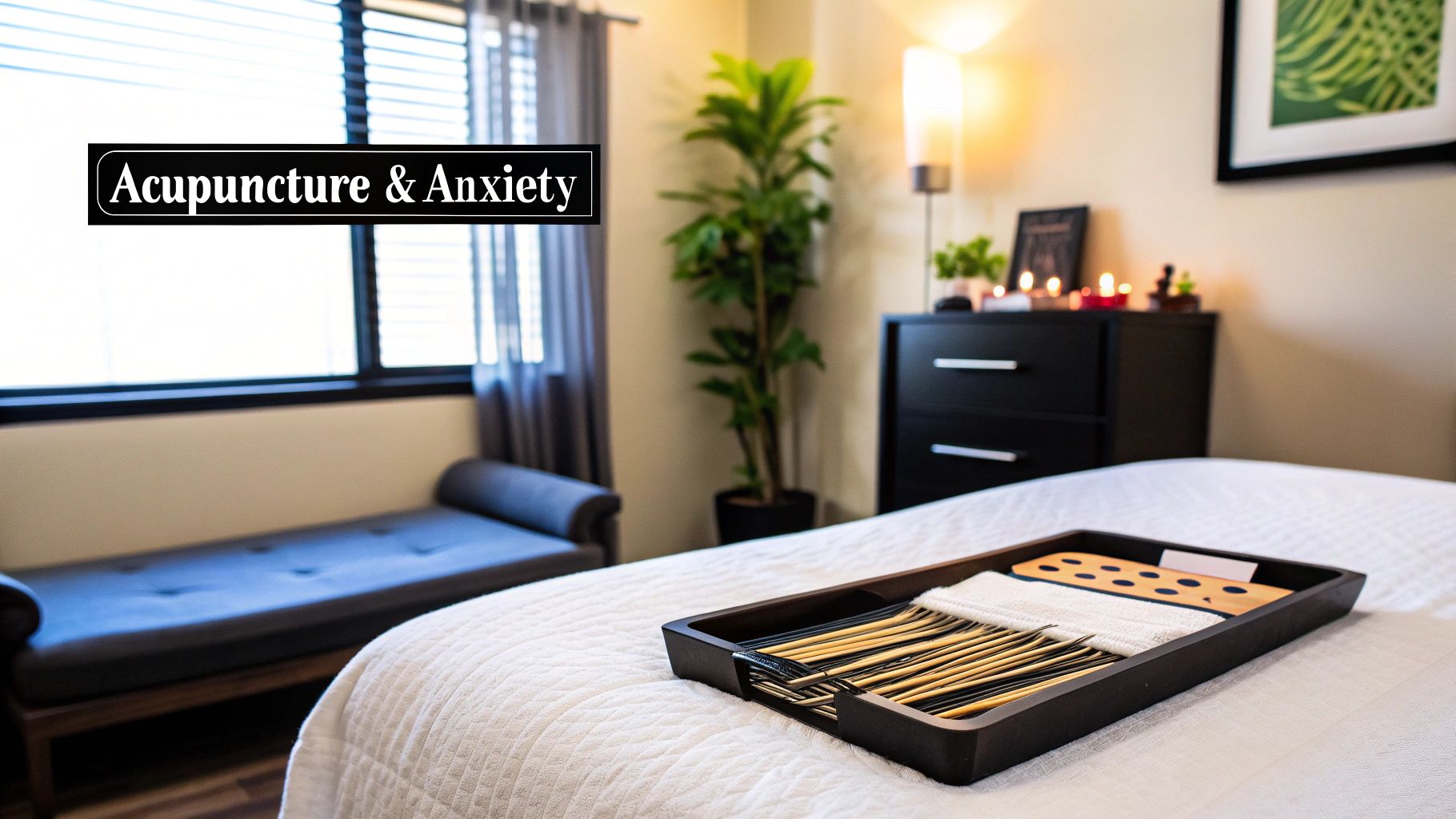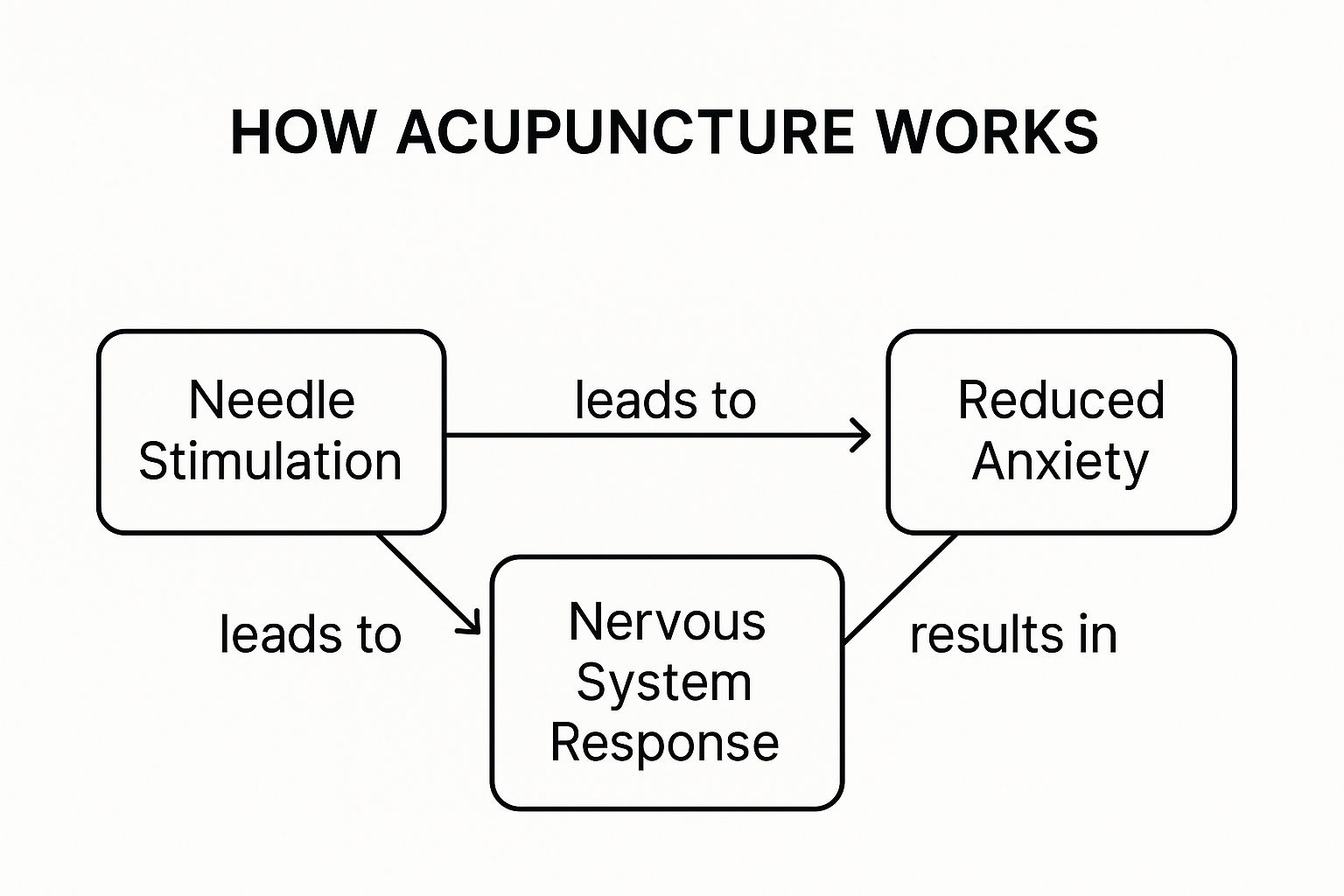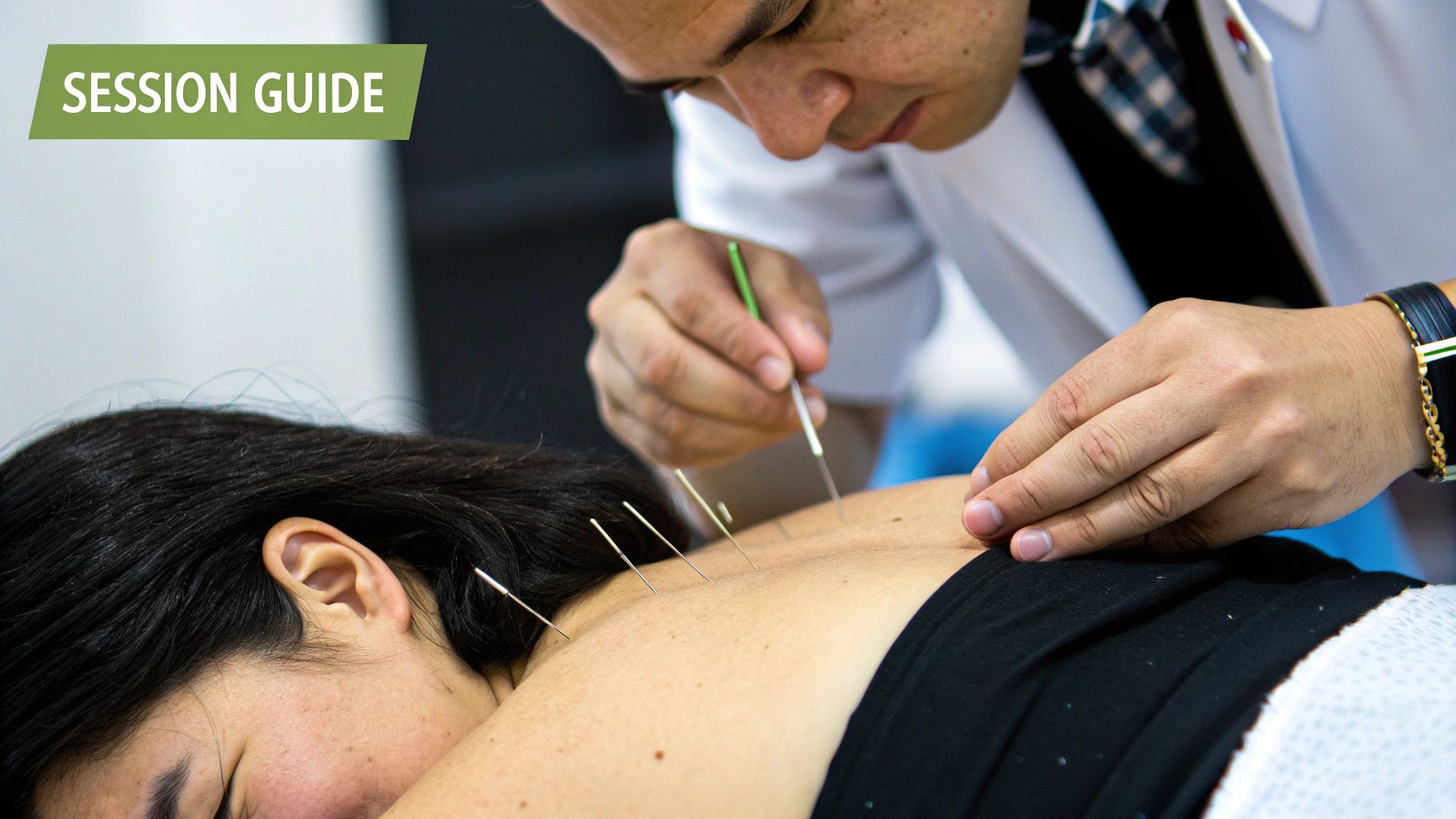Yes, a growing body of evidence shows acupuncture is an effective treatment for anxiety. This ancient practice isn't about masking symptoms; it's about addressing the underlying imbalances that fuel anxious feelings in the first place. Many people even report a palpable sense of calm after just one session, with lasting benefits building over a course of treatments.
Unpacking the Potential of Acupuncture for Anxiety
When you’re caught in the grip of worry, racing thoughts, and that all-too-familiar physical tension, finding real relief can feel like an impossible task. While conventional treatments like therapy and medication are essential tools, many are also looking for complementary approaches that work with the body’s own healing systems.
This is where acupuncture, a cornerstone of Traditional Chinese Medicine (TCM) with thousands of years of history, steps in as a powerful ally for mental wellness.

But is acupuncture actually good for anxiety in a way that’s backed by modern science? The answer is becoming clearer every day. This guide goes beyond a simple "yes" or "no" to explore how and why it works. We'll look at it from both traditional and scientific viewpoints, review the clinical evidence, and walk you through what to expect during a session.
What You Will Discover
Our goal is to give you a clear, evidence-based picture of how this practice can become a valuable part of your anxiety management plan. Throughout this article, you will learn about:
- The Dual Perspective: How both ancient Chinese wisdom and modern neuroscience explain the calming effects of acupuncture.
- The Scientific Proof: A look at key studies and what they tell us about acupuncture's success in reducing anxiety symptoms.
- Your First Appointment: A step-by-step walkthrough of what happens during an acupuncture session specifically for anxiety.
- Building Resilience: The crucial difference between short-term relief and making long-term changes to your nervous system's baseline.
- An Integrative Approach: How to safely combine acupuncture with other therapies like counseling and medication for a more complete care plan.
By digging into these areas, you'll have the information you need to decide if acupuncture is the right path for you.
To give you a quick overview, this table summarizes the key points we'll be covering.
Acupuncture for Anxiety at a Glance
| Aspect | Summary |
|---|---|
| Primary Goal | To restore balance to the body's energy (Qi) and calm the nervous system, addressing the root causes of anxiety. |
| Mechanism (TCM) | Unblocks stagnant Qi in meridians related to emotions like the Heart, Pericardium, and Liver to soothe the "Shen" (spirit/mind). |
| Mechanism (Western) | Stimulates the release of endorphins and neurotransmitters (like serotonin), reduces stress hormones (cortisol), and calms the HPA axis. |
| Key Benefits | Reduced racing thoughts, less physical tension, improved sleep, better emotional regulation, and a greater sense of well-being. |
| Treatment Frequency | Typically starts with 1-2 sessions per week, then tapers off as symptoms improve. A full course is often 8-12 sessions. |
| Time to See Results | Many feel calmer after the first session, with more significant and lasting changes appearing after 4-6 treatments. |
This summary is just the beginning. Let’s dive deeper into how this all works.
Acupuncture offers a unique approach by aiming to restore balance from within. Instead of just managing the symptoms of anxiety, it works to retrain the body's stress response, helping you build a more durable sense of peace and well-being over time.
How Acupuncture Calms the Anxious Mind
To really grasp how acupuncture helps with anxiety, it's useful to look at it from two different but complementary angles: the ancient wisdom of Traditional Chinese Medicine (TCM) and the evidence-based lens of modern science. Each perspective gives us a powerful piece of the puzzle.
From a TCM standpoint, anxiety isn't just a mental state; it's a sign that the body's vital energy, or Qi (pronounced "chee"), is out of balance. Think of your energy like a system of rivers flowing through specific pathways known as meridians. When you're healthy, that flow is smooth and steady. But things like stress, trauma, or persistent worry act like dams, blocking the river and causing the flow to become stagnant or chaotic. This disruption is what bubbles up as the mental and physical feelings of anxiety.
An acupuncturist uses ultra-fine needles as precise tools to gently clear these energetic dams. By stimulating specific points along those meridians, they help restore the smooth, harmonious flow of Qi. In TCM theory, this calms the spirit, or Shen, which is said to reside in the Heart, bringing a sense of peace back to the mind.
The Modern Scientific Explanation
Now, let's put on a modern scientific hat. From this view, acupuncture acts almost like a sophisticated switchboard operator for your nervous system. When those hair-thin needles are inserted, they stimulate nerves just under the skin.
These nerves send signals shooting up the spinal cord directly to the brain, setting off a chain reaction of positive biochemical changes. This process essentially coaxes your body out of the sympathetic nervous system state—that constant "fight or flight" mode that fuels anxiety—and into the parasympathetic state, which is all about "rest and digest."
In short, acupuncture helps turn down the volume on your body's internal anxiety alarm. It encourages the brain to release its own natural calming chemicals, effectively retraining your nervous system to be less jumpy and reactive over time.
This image here breaks down that core process, illustrating how the simple act of needle stimulation can lead to a calmer mind.

You can see the direct pathway: the physical action of acupuncture triggers a nervous system response that results in less anxiety.
Key Neurochemical and Hormonal Effects
So what's actually happening inside the body? Modern research has pinpointed several key mechanisms that explain how acupuncture helps ease anxiety. The stimulation has been shown to:
- Boost Endorphin Production: These are your body's natural "feel-good" chemicals. They don't just reduce pain; they also promote a deep sense of relaxation.
- Regulate Neurotransmitters: Acupuncture helps balance levels of serotonin and dopamine. These are critical mood-stabilizing chemicals that are often out of whack in people struggling with anxiety.
- Lower Stress Hormones: Studies have shown that acupuncture can decrease the amount of circulating cortisol, the body's main stress hormone that keeps you stuck in a state of high alert.
- Activate Calming Brain Regions: Using brain imaging, researchers have actually seen acupuncture decrease activity in the amygdala (the brain's fear center) while simultaneously increasing activity in parts of the brain that handle emotional regulation.
By working on this deep, physiological level, acupuncture does far more than just put a temporary band-aid on your symptoms. It actively helps correct the underlying neurochemical imbalances that keep the cycle of anxiety going.
To learn more about how these ancient ideas are put into practice today, you can explore this detailed look at traditional Chinese medicine for anxiety. It's this powerful combination of ancient theory and modern proof that makes acupuncture such a compelling approach for managing anxiety.
What the Science Says About Acupuncture and Anxiety
While the ancient principles of Traditional Chinese Medicine offer a compelling framework, it's natural to ask for the modern, hard evidence. Fortunately, a growing body of scientific research now backs up what practitioners have seen in their clinics for centuries: acupuncture is a legitimate and effective tool for managing anxiety.

We've moved well beyond just success stories. Clinical trials and large-scale reviews now provide measurable, quantifiable results. In these studies, researchers often compare genuine acupuncture to control groups, which might receive a placebo treatment (often called "sham" acupuncture) or conventional care like medication. Time and again, the findings point to real, positive outcomes for people seeking anxiety relief.
Key Findings from Clinical Research
The evidence isn't just trickling in from small, isolated studies. We're now seeing large-scale reviews that pull data from many different trials, giving us a much clearer picture of what's happening.
With anxiety touching so many lives worldwide, researchers are highly motivated to validate effective, low-risk treatments. The 2017 Acupuncture Evidence Project, for instance, analyzed data from over 400 randomized patients and found acupuncture to be moderately effective for anxiety. It often performed better than some conventional medications and held its own against talk therapy.
One standout study with 120 patients found that acupuncture managed to cut symptoms of anxiety and depression in half when compared to a combination of medication and psychotherapy. Other reviews consistently show significant drops in anxiety symptoms for those in acupuncture groups versus control groups, cementing its place as a safe and well-tolerated option. For a deeper dive, you can check out this evidence-based review of acupuncture for anxiety.
The bottom line? The benefits aren't just in a patient's head. They are quantifiable, repeatable, and showing up consistently across different studies and populations.
The scientific consensus is becoming clearer every day: acupuncture's impact on anxiety is statistically significant. It consistently outperforms placebo treatments and stands as a viable alternative—or a powerful addition—to standard medical care, all with minimal side effects.
How Studies Measure Success
So, how do researchers actually measure something as personal as anxiety? They rely on standardized, validated psychological questionnaires. Patients fill these out before, during, and after a course of treatment, giving researchers a clear before-and-after snapshot.
Here are a few of the gold-standard tools they use:
- Hamilton Anxiety Rating Scale (HAM-A): This is a detailed scale a clinician uses to rate the severity of a patient's anxiety.
- Generalized Anxiety Disorder 7-item (GAD-7) scale: A quick self-report questionnaire that helps screen for and measure the severity of generalized anxiety disorder.
- Patient Satisfaction Scores: Simple surveys that ask patients how they felt about their treatment and the results they experienced.
Study after study shows significant drops in these scores for patients who receive true acupuncture. The data not only confirms that patients feel better, but it also reveals high satisfaction rates and, crucially, lasting relief that often continues long after the treatment course is complete. You can explore more about the specific acupuncture benefits for anxiety in our detailed guide. This evidence-based approach gives us confidence that its calming effects are real and backed by solid science.
Your First Acupuncture Session for Anxiety
If you’re walking into an acupuncture clinic for the first time, it’s completely normal to feel a little unsure—especially when you’re already struggling with anxiety. Knowing what the process actually looks like can help ease those nerves and let you focus on the healing ahead. The whole experience is designed to be gentle and calming from the moment you arrive.
It all starts with a conversation. Your acupuncturist will sit down with you to get the full picture of what you're experiencing. We’re not just talking about racing thoughts or worry; we want to hear about the physical side of your anxiety, too—things like a tight chest, digestive upset, or trouble sleeping. This initial chat is crucial for us to tailor a treatment that gets to the root of your specific needs.
What Do the Needles Actually Feel Like?
Now for the part everyone wonders about: the needles. First, let’s get one thing straight. These aren't anything like the needles you get at a doctor's office. Acupuncture needles are sterile, used only once, and are incredibly fine—some are as thin as a single strand of your hair. Most people feel a tiny, fleeting pinch as the needle goes in, and many feel nothing at all.
Once the needles are in place, you might notice a gentle, dull ache or a warm, tingling sensation around the point. In acupuncture, we call this Deqi, and it's a good sign! It means the body's energy has been successfully engaged. For anxiety treatments, we often use points on the wrists to help calm the spirit, a powerful point between the eyebrows called Yintang, and specific spots on the ears, which serve as a map of the entire body.
The image below gives you a sense of the meridian pathways we work with.
This map shows how interconnected everything is in Chinese Medicine, allowing us to influence your emotional state through very specific physical points.
A Time for Deep Rest and Rebalancing
After the needles are set, your work is done. You’ll simply lie down and rest in a quiet, peaceful room for about 20 to 30 minutes. This isn't just waiting time; it's an essential part of the therapy. Many of my patients find this period so deeply relaxing that they drift off into a light, refreshing sleep.
This quiet, meditative state is where the magic happens. It gives your nervous system the chance to shift out of that constant "fight or flight" mode and into a state of profound rest and recovery, allowing your body and mind to begin rebalancing.
Hopefully, seeing how straightforward the process is helps demystify the experience. If you’d like an even more detailed walkthrough, you can learn more about what to expect during your acupuncture visit right here on our site. Walking into your first appointment armed with this knowledge can transform it from a source of uncertainty into a powerfully calming step on your journey.
Short-Term Calm Versus Long-Term Resilience
One of the most powerful things I see in my clinic is how acupuncture works on two different levels for anxiety. It provides both that immediate, welcome sense of relief and, over time, helps you build genuine emotional resilience. It’s not just a quick fix.
Many people are surprised by the deep calm they feel during or right after their first session. That feeling—like a wave of tranquility washing over you—is often what makes people realize this can really work. It’s incredibly effective for getting a handle on acute stress or the rising tide of panic.
But the real magic happens over a full course of treatment. The bigger goal is to fundamentally retrain your nervous system, helping it build lasting strength.
From Temporary Relief to Lasting Change
Think of it this way: when you’re stuck in an anxiety cycle, your nervous system's "default setting" is high alert. Each acupuncture session acts like a guided lesson, teaching your body how to shift out of that fight-or-flight mode and return to a state of rest and balance.
With consistent treatments, your body and mind start to remember this calmer baseline. It becomes easier to access and harder for daily stressors to knock you off balance. This isn't just a temporary feeling.
The effects really do stick around. Studies have shown time and again that the benefits of acupuncture for anxiety often last for months after the treatment course is finished. Instead of just papering over symptoms, we're working to correct the root imbalances that keep the anxiety cycle going. It's about helping your body relearn how to manage stress all on its own.
A major 2021 meta-analysis really drove this point home. It found that acupuncture provides significant relief, especially in the first few weeks of treatment—often reducing symptoms more quickly than some medications. Plus, people tend to stick with it. With dropout rates typically under 20%, it’s clear that this is a therapy people find both tolerable and effective for building a more durable sense of peace. You can read more about these acupuncture findings here.
I often compare it to physical therapy for the nervous system. The first session might loosen a tight knot of tension, but completing the full plan is what strengthens your internal “muscles” for emotional regulation, making you less vulnerable to future stress.
This cumulative effect is what elevates acupuncture from a momentary escape to a genuine strategy for creating a less anxious, more resilient you. It’s about building a foundation of calm that truly lasts.
Combining Acupuncture with Other Anxiety Therapies
Think of acupuncture as a key player on your wellness team, not a solo act. While it's certainly powerful on its own, its real strength often emerges when it works in concert with other therapies. When you weave acupuncture into a broader mental health plan, you create a powerful synergy where each element boosts the effectiveness of the others.

This is especially true when pairing acupuncture with psychotherapy, like Cognitive Behavioral Therapy (CBT). The profound state of relaxation an acupuncture session can induce does more than just feel good—it can actually prime your nervous system for the deep work of therapy. Many people find they can open up and engage more meaningfully after a session has quieted that persistent "fight-or-flight" response.
Creating a Coordinated Care Team
Acupuncture can also be an excellent partner for those on anxiety medication. While medication targets neurochemical pathways, acupuncture helps restore the body's overall equilibrium. It can even help soften some common medication side effects, such as nausea or fatigue, adding a layer of calm that the medication alone might not provide.
For this integrated approach to be truly effective, communication is key. Your acupuncturist, therapist, and prescribing doctor should all be in the loop about the treatments you're receiving.
A collaborative care team ensures your treatment plan is cohesive and safe. By sharing insights, your providers can tailor their approaches to better support your journey, preventing conflicting treatments and maximizing positive outcomes.
This team-based model is showing its value in clinical research. A 2022 trial, for instance, studied patients receiving acupuncture for anxiety. After two months, an impressive 86.8% of those who received real acupuncture showed sustained, clinically meaningful improvement. In stark contrast, only 6.4% of the placebo group saw similar results.
This study underscores that genuine acupuncture delivers lasting benefits far beyond a placebo effect, reinforcing its value as part of a well-rounded plan. You can discover more about these long-term acupuncture benefits on JAMA Network.
The ultimate aim is to build a supportive structure for your well-being, where each therapy lifts the others. This creates a more robust and resilient foundation for your mental health.
Your Questions About Acupuncture for Anxiety, Answered
It's completely normal to have questions when you're thinking about trying something new for your health. Getting clear, straightforward answers can help you feel confident and comfortable as you take that first step. Let's walk through some of the most common things people ask before starting acupuncture for anxiety.
How Many Sessions Will I Need?
While your journey is unique to you, a good starting point is usually one to two sessions a week for the first four to six weeks. This consistent approach helps us build momentum and start calming your nervous system right away.
Many people tell me they feel a real sense of calm after just one or two visits. But sticking with the full course of treatment is what really creates lasting change. Your acupuncturist will constantly check in on your progress and tailor the plan to make sure it’s a perfect fit for you.
A helpful way to think about it is this: the first few sessions are like turning down the volume on that constant "anxiety alarm." The full course of treatment then works to rewire the entire system, building a more resilient and durable sense of peace.
Is It Going to Hurt?
This is probably the number one question I get, and I’m happy to say the answer is a resounding "no." Acupuncture needles are incredibly thin—about the width of a human hair. The sensation is nothing like getting a shot at the doctor's office.
Most people feel a tiny, fleeting pinch as the needle goes in, and then it's gone. What you might feel afterward is a gentle, dull ache or a warm, tingling sensation around the point. That's actually a great sign! It means your body's energy is responding to the treatment. The whole experience is so deeply relaxing that it’s not uncommon for patients to drift off to sleep on the table.
Are There Any Side Effects I Should Know About?
When performed by a licensed, qualified professional, acupuncture is exceptionally safe. The side effects are few and far between, and when they do happen, they are very mild.
Here’s what you might experience:
- Minor Bruising: A small, temporary bruise might pop up where a needle was placed.
- A Bit of Dizziness: Some people feel a little light-headed right after their session, which passes quickly.
- Deep Relaxation: It’s very common to feel blissfully calm or even a bit tired afterward as your body integrates the treatment.
The most important thing you can do to ensure a safe and positive experience is to choose a certified and experienced practitioner.
Ready to see how acupuncture can help you find your calm? At Eric Tsai Acupuncture and Herbs, we design personalized treatment plans to get to the root of your anxiety. Learn more and book your consultation today.

